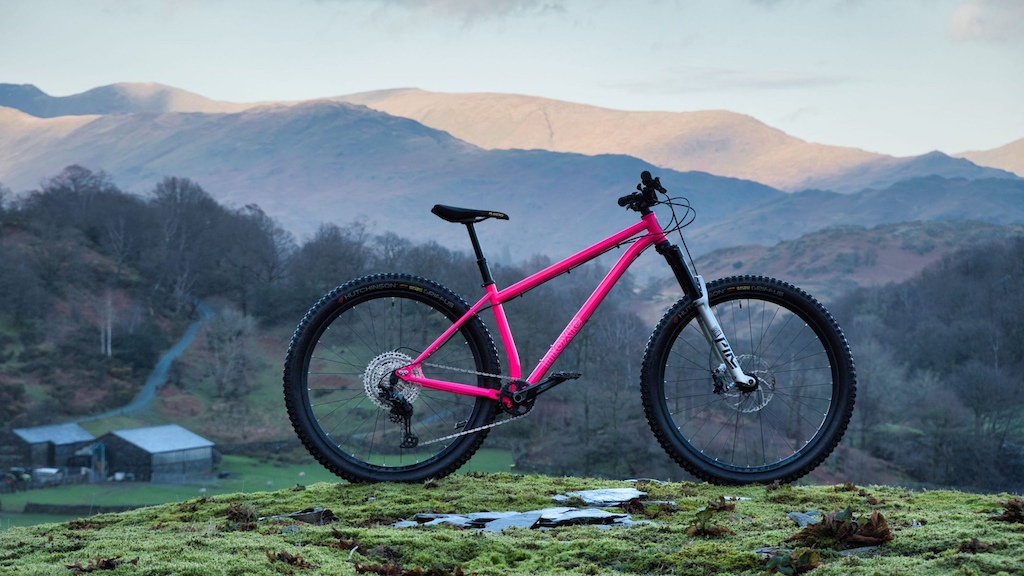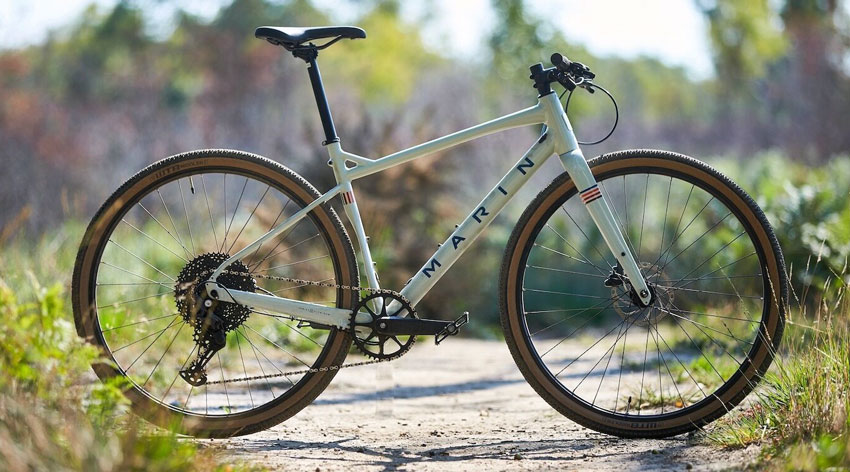What Is a Beginner Mountain Bike?
A beginner mountain bike is designed to offer newcomers a smooth entry into mountain biking. These bikes have vital features that prioritize comfort, control, and versatility, making them suitable for various terrains and skill levels. A beginner mountain bike typically includes a durable yet lightweight frame, reliable braking systems, and an intuitive gear setup. Unlike more advanced models, these bikes are often more affordable and require less maintenance, allowing new riders to focus on honing their skills without worrying about complex mechanical issues.
Types of Mountain Bikes
When choosing a beginner mountain bike, the type of bike is crucial. Here's a quick guide to the main types:

Hardtail Mountain Bikes: Hardtails feature a front suspension fork, providing cushioning over uneven terrain while keeping the rear end rigid. This design makes them more affordable and easier to maintain. They're versatile and perform well on various trails, making them a top pick for beginners.

Full-Suspension Mountain Bikes: These bikes have front and rear suspensions, offering superior comfort and shock absorption. While they are more expensive and complex, they excel in technical trials. Beginners might consider them if tackling rough terrains frequently.

Rigid Mountain Bikes: With no suspension, rigid mountain bikes are less common but can be suitable for smooth trails. They're lightweight and efficient, offering direct power transfer. However, they can be less forgiving on rough surfaces, which might be challenging for new riders. Understanding these options helps you make an informed decision tailored to your riding preferences and terrain choices.
Key Features to Look for in a Mountain Bike
When selecting a beginner mountain bike, focusing on key features can make all the difference:
Durable but Lightweight Frame: Choose a frame made from aluminum or steel. Aluminum frames are lighter and resist corrosion, which is ideal for new riders looking for ease of handling. While heavier, steel frames offer superior durability, benefiting rougher trails.
Wheel Size: You'll typically encounter 27.5-inch or 29-inch wheels. For beginners, 27.5-inch wheels are often preferable due to their skill and easier maneuverability. However, 29-inch wheels offer greater stability and better rollover capabilities, which are useful for more varied terrains.
Braking System: Disc brakes are a must. Hydraulic disc brakes provide excellent stopping power and control, which are essential for trail safety. Mechanical disc brakes are easier to maintain but still offer reliable performance for new riders.
Gears and Drivetrain: A 1x drivetrain (single front chainring) is ideal for a beginner mountain bike, simplifying gear shifting and minimizing maintenance. Look for bikes with a broad range of gears to tackle various terrains without the complexity of multiple front chainrings. With these features in mind, you can find a beginner mountain bike that balances performance, ease of use, and durability, ensuring a rewarding entry into mountain biking.
Budget Considerations for a Mountain Bike
Balancing cost and quality is crucial when setting a budget for your first mountain bike. Entry-level bikes typically fall within the $500 to $1,500 range. You'll find basic models with fundamental components at the lower end, perfect for light trails and occasional use. As you approach the higher end of the spectrum, bikes generally feature improved suspension, more durable materials, and better overall performance, which can enhance your riding experience on varied terrains. Consider how often you plan to ride and the type of trails you're interested in. Investing more initially can save money and hassle in the long run by reducing the need for frequent upgrades or repairs.
Popular Beginner Mountain Bike Models
Choosing the right beginner mountain bike can be daunting, but several models consistently stand out for their quality and value. Here are a few top-rated options:
Trek Marlin 5: This versatile hardtail is an excellent choice for new riders. It features a lightweight aluminum frame, responsive handling, and reliable components, making it suitable for various terrains. It balances performance and affordability, typically around $600-$700.
Specialized Rockhopper: Renowned for its durability and smooth ride, the Rockhopper offers comfortable geometry ideal for beginner mountain bike enthusiasts. It's well-suited for trail riding and provides a solid introduction to the sport, with a price range of $650-$800.
Giant Talon 3: Combining stability and speed, the Giant Talon 3 boasts a responsive design and excellent handling characteristics. It's a great all-rounder for starting, usually available for $600-$700. Its features make it a compelling option for varied riding conditions.
Mountain Bike Accessories
When outfitting your beginner mountain bike, a few essential accessories can significantly enhance your riding experience:
Helmet: Prioritizing safety, a quality helmet is essential for protecting your head during rides. Look for helmets with good ventilation and a snug fit.
Gloves: Mountain biking gloves provide added grip and cushioning, reducing hand fatigue and improving longer-ride comfort. They also protect hands from abrasions in case of falls.
Bike Locks: Security is vital, especially if you plan to leave your bike unattended. A robust bike lock ensures your beginner mountain bike stays safe when parked in public areas.
Hydration Packs: Staying hydrated is crucial on the trails. A hydration pack allows you to conveniently carry water and other essentials without adding weight or bulk to your ride.
Multi-Tool Kit: A compact multi-tool kit can be a lifesaver for on-the-go repairs and adjustments. It's a handy addition for addressing minor mechanical issues during your ride.
Bike Lights: If you plan on riding in low-light conditions, front and rear bike lights enhance visibility and safety, making you more noticeable to other trail users and vehicles. Investing in these accessories improves your overall biking experience and ensures you are well-prepared for various situations you might encounter on the trails. Equipping yourself properly allows you to focus more on enjoying your rides and less on potential challenges.
Where to Buy a Mountain Bike
Local bike shops are an excellent starting point when purchasing a beginner mountain bike. These shops provide expert guidance and allow you to test-ride various models, ensuring you find a bike that fits and meets your needs well. Online retailers are another great option, often offering a more comprehensive selection and competitive pricing. However, be sure to read reviews and verify return policies. For those on a budget, second-hand marketplaces can be treasure troves for quality bikes at reduced prices. When buying used, it's crucial to have the bike professionally inspected to avoid hidden issues. You can find a beginner mountain bike that suits your preferences and budget by exploring these purchasing avenues.
Beginner Riding Tips
Embarking on your first rides with your beginner mountain bike can be thrilling and daunting. Here are some practical tips to help you get started on the right foot:
Start with Easy Trails: Begin your mountain biking journey on smooth, less technical trails. This will allow you to get a feel for your bike and build confidence without the pressure of navigating rugged terrain.
Master Gear Shifting: Understanding how and when to shift gears is essential for a smooth ride. Practice turning on flat sections and gentle inclines to maintain an efficient cadence and conserve energy.
Focus on Body Position: Proper body positioning helps you maintain control and stability. Keep your elbows slightly bent and stand on the pedals when riding over obstacles or rough patches. This stance allows your bike to move beneath you, improving balance and comfort.
Look Ahead: Always focus on the trail ahead rather than directly in front of your wheel. This helps you anticipate obstacles and choose the best line through technical sections, enhancing your control and reaction time.
Brake Smart: Learn to use your front and rear brakes effectively. Gradual, controlled braking is critical to maintaining traction and stability, especially on descents. Avoid sudden, hard braking to prevent skidding or losing control.
Regular Maintenance: Keeping your beginner mountain bike in good working order is crucial for safety and performance. Regularly check tire pressure, clean your drivetrain, and ensure all bolts are tight. A well-maintained bike is more reliable and enjoyable to ride. Following these tips, you can make the most of your beginner mountain bike and build a strong foundation for future rides. Embrace the learning process, stay patient, and, most importantly, have fun exploring the trails!

